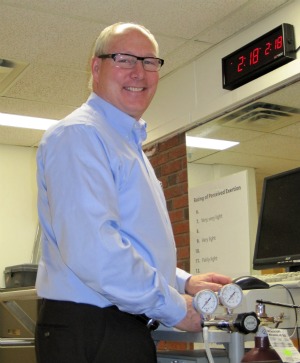
Bill McGarvey completed his PhD in the faculty in 2004, then came back to wear the hats of research assistant, instructor and firefighter fitness laboratory coordinator. He says life's never been sweeter!
Bill McGarvey has found his perfect job - again.
"I am having the time of my life," is the way McGarvey, a 2004 exercise physiology doctoral graduate, former musician and retired firefighter, enthusiastically describes his serendipitous new career - or rather careers. For McGarvey's new career sees him wearing not one hat, but three - and they're all very different and, most importantly, satisfying.
McGarvey, who was a full-time firefighter while obtaining his BPE, Master's and doctoral degrees in the Faculty, retired from firefighting in 2009 after 30 years, then was invited to return as a research assistant to his former PhD supervisor, Dr. Stewart Peterson, who heads up the work physiology lab, and Northern Lung Centre head researcher Dr. Mike Stickland, also a doctoral alumnus and contemporary of McGarvey's.
McGarvey is also teaching a number of undergraduate exercise physiology classes, as well as coordinating the firefighter testing laboratory, headed by Petersen, which conducts applicant testing for fire departments across Northern Alberta. It's clearly a long way from where he started out.
It's also clear that McGarvey is very much in his element. "I like the variety," he says. "All three jobs are extremely interesting and different. Participants in Mike's studies have COPD (chronic obstructive pulmonary disorder) and they basically come into the lab, lay on the bed and you're very quietly taking different measurements to determine different aspects of their physiology; in Petersen's lab they're on the treadmill in full (firefighter) gear, working hard - and the teaching is a unique experience, especially when you're standing in front of 60 students!"
It would be an understatement to say that McGarvey's career has been adventurous. A gifted tenor saxophone player, he went to Grant MacEwan College for a music diploma after spending two years in the Education faculty and one in Physical Education and Recreation. When he graduated from MacEwan, McGarvey says, "I didn't want a nine-to-five job as it would be difficult to still have a music career so I joined the fire department. It was a great time!" and no (because I had to ask) it's not much like the TV hit-series about firefighters, "Rescue me."
"The firehall environment is the same, but an actual fire is very different," he says. "When you go into a house that's on fire it's pitch black with smoke. You're dragging a hose; you can't see anything in front of you. It's hot; you don't know where the fire is, whether above or below you, then all of a sudden you see a lick of fire on the stairs and up over your head. Each fire is different, exciting…"
"I was working on the night the tornado hit Edmonton in July 1987," McGarvey remembers one of his most memorable days. "We travelled to most of the sites that had been hit. Seeing Belgravia Road flooded, semis and cars tossed upside down and in one part there was forest and I was in the back of the pump looking at trees, trees, trees, then suddenly all the trees were snapped off at about 10 feet. It was like a giant alleyway about 50 feet wide. Then we passed it and there were trees again."
At age 32, McGarvey came back to university, ready to tackle his unfinished degree. "I took a physiology class and fell in love with it," he says.
That growing interest led to a master's degree with Dr. Mohan Singh on muscular strength and endurance and giving McGarvey a chance to work with the military, as they developed applicant testing protocols. With the desire to learn more still strong, he pursued a doctoral degree under Petersen looking at how the body uses fuels like carbohydrates and fats in the recovery period after moderate intensity exercise or more intense interval training, and how various enzyme levels rise or drop.
McGarvey didn't come back to university with a new career in mind though; he came to fulfill a need that had been gnawing at him as unfinished business, but having completed not one but three degrees, he offers this advice for anyone wondering what career path they should follow.
"Of course you should follow your passion," he says. "But there are two sides to passion. You can find something that you're interested in and go after it, but also you can create a passion for anything you learn and love. The more you learn about something the better you become at it. Go in with the right attitude and the right open mindedness and you'll probably develop a passion for it."
Bill McGarvey's "Great Adventure" through many varied paths proves his point perfectly.